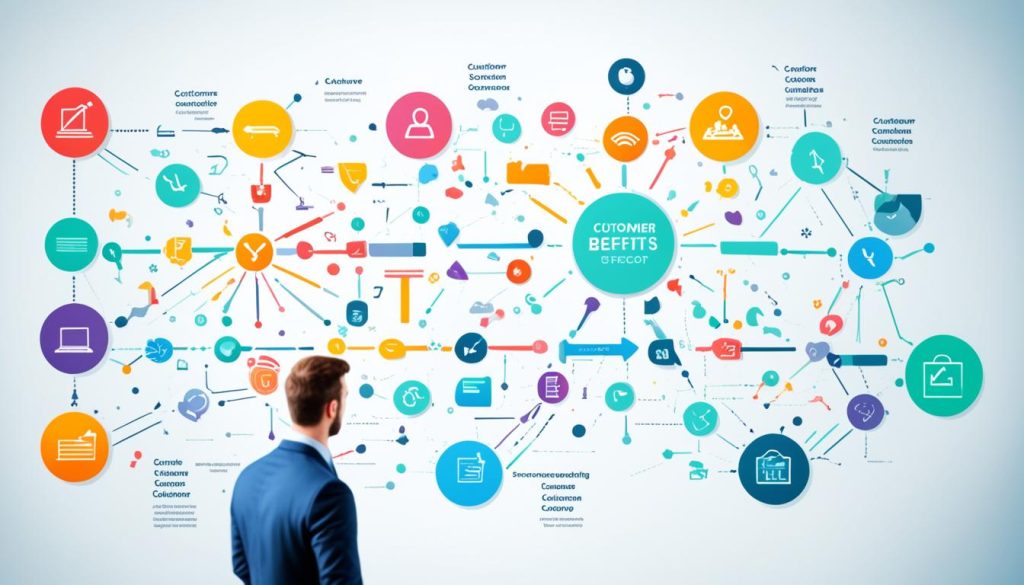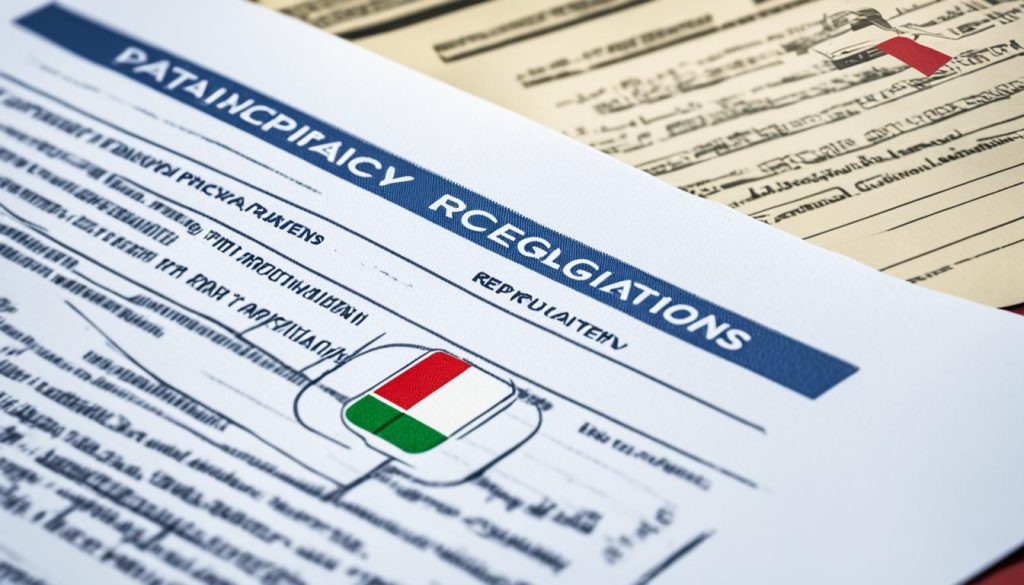“If you cannot measure it, you cannot improve it.” This quote by Peter Drucker highlights the importance of customer intelligence analytics today. For those looking to start a business in Italy, using customer intelligence analytics is key. It helps you understand what customers like and what they want.
In Italy, knowing what consumers want is crucial to stay ahead. Market research is vital for success. By using customer data well, businesses can offer what the market wants. This leads to a strategy that really speaks to Italian customers.
Key Takeaways
- Customer intelligence analytics is vital for informed decision-making.
- Understanding market trends is essential when starting a business in Italy.
- Data-driven insights can enhance business strategies significantly.
- Effective market research identifies customer preferences and needs.
- Adapting to the competitive landscape ensures business optimisation.
- Leveraging analytics can provide a competitive advantage.
The Importance of Market Research in Italy

Market research is key in Italy’s vibrant market. Companies starting out in Italy must tackle the challenges of regional differences and unique consumer tastes. It’s vital to understand these aspects through detailed market research for successful business planning.
There are many ways to do market research in Italy. Surveys are a top way to get insights by talking directly to potential customers. Focus groups offer a close look at specific products or services, giving insights that surveys might not capture. Looking at existing data also helps, showing market trends and predicting future actions.
Getting market research right is crucial. It helps companies move through Italy’s complex market smoothly. By matching products with what local consumers want, companies boost their chances of doing well. Staying on top of market trends helps make smart choices, making sure strategies meet what consumers like and expect.
Understanding Customer Behaviour in the Italian Market

Exploring customer behaviour in Italy shows a mix of cultural, economic, and social factors. These factors shape the unique preferences of consumers. It’s key for businesses to understand these to meet the diverse needs of Italian shoppers.
Factors Influencing Customer Behaviour
Many things affect how Italians shop. Knowing these can help businesses do well in the market:
- Cultural Heritage: Strong regional identities and traditions shape consumer trends and preferences in Italy.
- Quality Over Quantity: Italians often choose quality products over quantity, preferring brands that match this standard.
- Economic Conditions: The economy’s ups and downs affect spending habits, leading to changes in buying behaviour.
- Social Media Influence: Social media’s growing role changes how consumers interact with brands and make purchases.
- Environmental Awareness: More people now choose eco-friendly options due to a growing focus on sustainability.
These factors make the Italian market unique for businesses. Understanding them helps in making strategies that appeal to Italian consumers. This way, businesses can better meet the needs of the market and its customers.
Key Benefits of Customer Intelligence Analytics

Using customer intelligence analytics brings big wins for businesses wanting to improve. It helps make customer experiences more personal. By looking at what customers like, companies can make products that fit their needs better.
Marketing gets a boost too. Analytics helps find the right people to target, making ads more effective. With these insights, companies can spend their marketing budget wisely and see better returns.
Also, customer intelligence analytics helps businesses stay ahead of the game. By predicting trends, they can act before others do. This means they can grab new chances before their competitors can.
These insights also help improve what companies offer, making customers happier and more loyal. Companies that use customer intelligence get better at meeting changing customer needs.
Tools and Techniques for Effective Data Collection

Understanding how to collect data well is key to getting valuable insights on customers. For market analysis, the right tools and methods help connect with customers better. Businesses looking to boost their analytics should mix both qualitative and quantitative methods.
Data collection tools like surveys are great for getting direct feedback. Sites like SurveyMonkey and Typeform make creating surveys easy. They help uncover what customers like and how they behave. CRM systems, such as Salesforce, also track customer interactions, giving insights into their paths.
Tools for monitoring social media, like Hootsuite and Sprout Social, give real-time info on what customers think and what’s trending. They help businesses see what people are saying about them and spot new topics. Web analytics software, including Google Analytics, is also crucial. It shows who visits the website and how they interact with it, adding to the market analysis.
When picking analytics software, make sure it matches your business goals. Choose tools that fit the Italian market well, offering support for the local language and regional needs.
How to Implement Customer Intelligence Analytics

Starting with customer intelligence analytics needs a clear plan for success. Here are the main steps:
- Defining Objectives: Know what you want to learn from using analytics. Having clear goals is key to a good analytics plan.
- Choosing the Right Tools: Pick analytics tools that match your goals. Look for ones that make combining data easy and efficient.
- Training Staff: Make sure your team knows how to use the analytics tools well. Regular training helps get the most out of analytics.
- Ensuring Data Quality: Make sure the data is accurate and reliable. Good data is crucial for a strong analytics strategy.
For a successful analytics strategy, link your goals with your business aims. Keep an eye on progress and tweak your approach as needed. This way, you can improve your understanding of customers and how to engage with them.
Customer Intelligence Analytics: Real-World Applications

In Italy, customer intelligence analytics is key for businesses. It helps them understand what customers want and need. This knowledge lets companies make better business plans.
By using customer intelligence tools, brands can improve their marketing and products. This makes their offerings more appealing to customers.
Many case studies show how big an impact customer intelligence has. For example, a famous fashion brand used these analytics to boost its marketing. By knowing what customers liked to buy, the brand made targeted ads. This led to more sales and loyal customers.
In the food and drink sector, companies use customer intelligence to make better products. A well-known Italian winery is a great example. It used customer feedback to create new wines. This move helped the winery grow its market share and get great reviews from customers.
These stories show how Italian companies use customer intelligence to grow. By using data to understand their customers, they make strategies that really connect with people. This approach helps them stay ahead in the market.
Understanding Cultural Nuances in Italy

It’s key to grasp cultural subtleties for businesses in Italy. Each region has its own traditions that shape how people act. These traditions, from food likes to holiday celebrations, affect what customers expect.
Marketing must take these differences into account to hit the mark. By valuing and using local customs, a brand can really shine. For example, launching campaigns during local festivals can boost interest. Also, matching products with traditional tastes is a smart move.
- Recognising local dialects and communication styles
- Adapting marketing messages to reflect cultural values
- Ensuring product design resonates with regional tastes
Adding these cultural touches to business plans builds stronger bonds with customers. Focusing on Italian culture helps build trust and loyalty. This leads to better success in this lively market.
Leveraging Social Media for Customer Insights

Social media platforms are key for businesses to get to know their customers well. Companies can use social media analytics to find out what customers like and want. Sites like Facebook, Instagram, and Twitter are full of information about what customers prefer and do.
Here are some ways to make the most of social media:
- Use listening tools to keep an eye on what people say about your brand.
- Talk to your followers to get their thoughts and keep them involved.
- Use analytics software to spot trends in how customers behave.
It’s important to analyse the data to get real insights from what customers say. Looking at comments, likes, and shares can show what people really think. Brands can then make their products better and market them in a way that really speaks to customers.
Integrating Customer Feedback into Business Strategy

It’s vital to use customer feedback for long-term success in any business. This starts with strong methods like the Net Promoter Score (NPS) and customer satisfaction surveys. These tools help understand what customers like and what they don’t.
Then, by analysing this feedback, businesses can spot trends and make better decisions. Turning this data into actions is key to making products and services that customers want. Using feedback in a strategic plan helps improve continuously, letting businesses quickly adapt to new needs.
Being quick to make changes based on what customers say is crucial. Companies need to be ready to tweak their plans as needed. This keeps customers happy and makes the business strategy more effective.
Data Privacy Regulations in Italy

Data privacy rules are key in customer intelligence analytics. In Italy, all businesses that deal with personal data must follow the General Data Protection Regulation (GDPR). This rule makes sure customer info is used right, protects people’s rights, and boosts consumer safety.
Businesses need to know what GDPR says they must do, including:
- Getting clear consent from customers before taking their personal data.
- Telling people how their data will be used, stored, and processed.
- Putting in place data protection steps to keep consumer info safe.
- Respecting people’s rights to see, fix, and delete their data if they ask.
Following these rules builds trust with customers and lowers the chance of big fines for not following them. It’s crucial to understand data privacy and act ethically to be a respected business in Italy.
Challenges in Conducting Customer Intelligence Analytics

Customer intelligence analytics come with many challenges. It’s key for businesses to understand these to thrive in Italy’s competitive market. Data quality is a top issue. Bad data can lead to wrong decisions.
Integrating data from different sources is hard. Data formats may not match, making it tough to get a full view of customer behaviour. Also, making sense of the data can be tricky. Analysts need skills to spot important trends to help with market entry.
Creating a strong data governance framework can help. A good plan keeps data right and consistent. Focusing on data quality lessens the effect of analytics challenges on business.
Choosing the Right Analytics Platform
Choosing the right analytics platform is crucial for businesses. They need to think about their specific needs and goals. Each platform has different features, like data visualisation and predictive analytics tools. Options like Google Analytics, Tableau, and Microsoft Power BI offer various levels of flexibility and functionality.
For small businesses, easy-to-use analytics tools are often best. They provide quick insights with little setup. But, big companies need more advanced software. This software can handle big datasets and complex queries.
It’s important to look at both the current and future needs of the business. The chosen platform should support growth and stay useful as the business changes.
Finding the right balance between functionality and ease of use is key. By researching and trying out different tools, businesses can make smart choices. This helps them improve their customer insights, leading to better engagement and growth in the Italian market.









